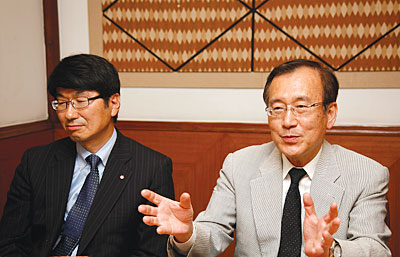President Ram Baran Yadav conferred the first Gautam Buddha International Peace Award to Tadakashi Akiba, ex-Mayor of Hiroshima and Tomishisa Taue, Mayor of Nagasaki, at a ceremony in Lumbini on Buddha Jayanti, 17 May. The two mayors were interviewed by the Nepali Times shortly before they departed for Japan.
Nepali Times: How do you feel, coming to Kathmandu to receive the Gautam Buddha International Peace Award?Tomishisa Taue: We have found the people of Nepal are peace-loving. We can do things together. We have acquired new kind of confidence from your recognition of our campaign. 
Tadakashi Akiba: This is the first time that Hiroshima and Nagasaki together have been awarded together, even though of course we have worked together. It is an expression of the commitment of Nepal for peace and a nuclear-free world. I believe that you are helping create a new era for the world by instituting this award. The world is in a state of flux and this is the start of a new era.
There is a sense that the anti-nuclear weapons movement has weakened significantly worldwide in the last decade. Perhaps you are trying to revive the momentum?
Akiba: As a journalist, you are interested in describing condition of the world. Our business, on the other hand, is to represent the hibakusha, the survivors of the nuclear bomb in Hiroshima and Nagasaki. Their voices have not weakened, and they have continued to tell their story over the years. Their wish has always been to create a nuclear-weapons-free world.
The Mayors for Peace is a group which has grown rapidly in recent years. Some 5,000 mayors from around the world have come to realise that we do represent the universal voice of the world's population. Previously, the perception of our movement was influenced by the media, which has been extremely partial in describing the anti-nuclear weapons movement. Thus, we were seen through the ideological prism, so the many people who abhor ideology but are against nuclear warfare stayed away. The Mayors of Peace contend that nuclear weaponisation is not an ideological issue, it is an issue of the city, people and family. To fight nuclear weaponry is a legitimate and crucial issue for the survival of humanity. If we don't get rid of nuclear weapons, they will get rid of human race. This is the realisation which has helped the Mayors for Peace to grow.
In Nepal, we are surrounded by three nuclear weapons states: Pakistan, India and China. Can you tell us from your experience how the people of Nepal can feel secure?
Akiba: Mayors for Peace have member cities from India, Pakistan, Nepal and China. Increasing the members from those countries will help. We have 50 member cities from Israel, 38 from Palestine, and we believe that this helps dampen the tension. Exchange of young people between the cities is another way to build a peaceful future. In Hiroshima, we have hosted youths from India and Pakistan and this has helped build understanding.
Taue: We cannot make treaties between the countries because Mayors of Peace is a non-state entity. We try to create a mindset which helps governments to enter into conventions and treaties. We seek to represent the universal values of all the people of the world, and influence policy-makes towards nuclear disarmament.
How does a city like Kathmandu work towards opposing nuclear weapons, given that we have not had an elected mayor for a decade?
Akiba: You are putting emphasis on the organised system at a time when people's lives and interests are the stake. There is a need for the people to organise themselves in the best way possible to make their voice heard. I do not understand the system in Nepal, but those who oppose nuclear weaponisation can work even through though neighbourhood organisations, volunteer groups and NGOs. Nuclear weapon in that state might be far remote too far removed from everyday life. Even without mayors, I am sure the people in the urban communities of Nepal have founds ways to express themselves. Perhaps, given enough information about the scourge of nuclear weapons, they might do the same thing.
Taue: Nuclear weapons were born as the result of distrust. After American developed nuclear weapons, the Soviet Union, China, France and the UK followed suit. For the sake of social and economic development, the international community slowly understood the need to curtail the arms race, including the nuclear arms race. In order to promote nuclear disarmaments, and convince reluctant governments, we are networking with the civil society, the United Nations, as well as those countries which are pro-active.
You are one of the first visitors to come out of Japan after the tsunami and threat of nuclear leakage. What is the feeling among hibacusha for the tsunami survivors?
Akiba: Any time a disaster hits Japan, we are reminded of the nuclear events in Hiroshima and Nagasaki. People feel an urgency to go to the affected area and carry out emergency relief works. We still have the memory of what it was like in the aftermath of the nuclear attack on our cities, and this gives added sensitivity.
Taue: Firstly, we must remember that human-made disaster is different from natural disaster. The survivors of Nagasaki are campaigning for a cause that nobody should suffer from any kind of risk. Only a few scholars are aware of the dangers of the leakage from nuclear power plants, it is not something that is generally understood.


